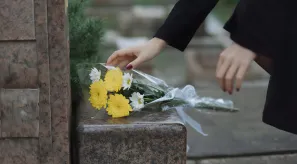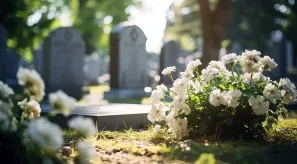Planning your own funeral not only ensures that your last wishes will be carried out, but also eases the emotional and financial burden on your loved ones. At Stelae we can help you plan your own funeral while you are still alive so that everything is in place.
When planning your own funeral, where should you start?
When planning your own funeral, you need to consider every detail, from the paperwork to the wake and the farewell ceremony. Therefore, when it comes to organising everything, it's important to ask yourself questions about how you want your funeral to be:
- The type of service
- Where to hold it
- The kind of cultural and/or religious traditions
- What aspects you would like to customise
Keep in mind that the cost of a funeral can vary depending on the decisions you make, so the financial factor is also something to think about.
Things to consider when making your own funeral arrangements
As we have already said, asking yourself questions about what your wishes are when planning your own funeral will help you decide what services to arrange. What questions should you be thinking about? We know that there are many things to consider, so here are some guidelines to help you gather your thoughts.
Do you want a funeral ceremony to take place when you die?
Not everyone wants to have a farewell ceremony after their death. Occasionally, people prefer to have a simpler farewell.
In most cases, however, people do wish to have a ceremony which may include the following funeral services being hired:
- Funeral home
- Floral arrangements
- Catering
- Music
If you prefer something simpler and more intimate, you can always state that you do not want any event to be held in your honour.
Where will your funeral take place?
Choosing your final resting place is one of the most important decisions when it comes to planning your own funeral. The options are becoming increasingly diverse and include niches, tombs, pantheons, family mausoleums, columbariums, and so on.
Innovative and sustainable options are also emerging such as eco-friendly funerals, eco-friendly urns and the option of planting a tree where your ashes will rest.
What funeral service do you wish to arrange after your death?
Linked to the previous question, the funeral service you choose will also influence where the funeral will take place. This is because when you choose between cremation or burial, the location or the kind of resting place may change as a result.
Cremation offers you many more options in this respect and, consequently, also allows you to economise on funeral costs if you are on a tighter budget.
What customs should be included in your funeral arrangements?
Nowadays, funerals can be increasingly more personalised. This allows you to choose the options you prefer and adapt them to your beliefs, customs or wishes.
You can opt for a religious or secular funeral and plan the ceremony down to the smallest detail by including the funeral services of your choice. For example you can choose:
- whether you want a wake
- where you want the wake to take place
- whether or not the coffin will be present at the wake
- whether or not to have a farewell ceremony
- the type of ceremony, if you decide to have one
- the readings and even the people who will give them
- the flowers, the music and the catering
Your decisions will depend on your preferences and the budget you have available to plan your own funeral.
What will the total cost of your own funeral be and how will it be paid for?
The total cost of your funeral will depend on what services are contracted. It will also be influenced by factors such as the funeral company you choose to use, the location of the funeral, the quantity and quality of the funeral services you arrange, and so on.
In addition, when planning your own funeral, you have the option to pay in several instalments, so the cost can be spread over a period of time when you are still alive.
Remember that the cost of cremation is usually cheaper than the cost of a burial so this is an important detail to consider when it comes to making a final estimate of the cost.
Procedures and documentation required when making your own funeral arrangements
When planning your own funeral, your wishes can be recorded as a supplement to your last will and testament.
It allows you to leave instructions about how you want the funeral to be and other health-related decisions.
The last will and testament certificate certifies that it has been done before a notary, while the living will allows you to record the care and treatment you wish to receive in the event of any illness or accident which makes you unable to express your own wishes, as well as the fate of your body and organs after your death.
This documentation is essential if you really want your wishes to be carried out, because if there is nothing in writing, you will have to rely on your relatives to carry out these requests when you are not around, bearing in mind there is no law that obliges them to do so.
How to communicate your wishes to your relatives after planning your own funeral
Even if you leave written instructions for your relatives when planning your own funeral, it is important that they know where these instructions are located.
Let your immediate family know what your wishes are and provide them with all the details of your funeral plan including the funeral company you have chosen, the insurance company and the notary. This will reduce the burden on them after your death.



